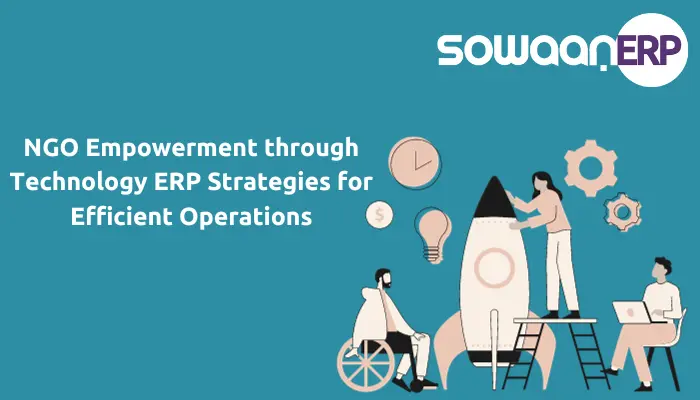
In the realm of social work, non-governmental organizations (NGOs) hold a critical position. Particularly in Pakistan, where these bodies are instrumental in addressing societal challenges. A major facilitator in this scenario is the NGO ERP software in Pakistan, which has emerged as a key tool for NGO empowerment.
Efficiency and productivity with ERP
ERP, or Enterprise Resource Planning, is a software system that integrates various functions into one complete system to streamline processes and information across the entire organization. With ERP, NGOs can manage their operations more efficiently, leading to increased productivity. The system ensures that resources are well managed, reducing wastage and promoting effective use.
Overcoming challenges with NGO ERP software
Non-profit organizations, including NGOs, face several challenges in their operations. These range from resource management and fundraising to regulatory compliance and reporting. Here is where the ERP software comes into play.
With ERP, NGOs can overcome these hurdles effectively. For instance, resource management is a significant challenge for NGOs. They need to ensure optimal use of their resources for maximum impact. ERP software helps by providing a comprehensive view of all resources, allowing NGOs to allocate them efficiently.
Fundraising, another critical aspect, can also be managed better with ERP. The software can track and manage donations, ensuring transparency and building trust with donors. It can also help NGOs strategize their fundraising activities based on real-time data.
When it comes to regulatory compliance, ERP proves to be a boon. NGOs are required to comply with various regulations and need to maintain accurate records. ERP software can automate this process, reducing errors and saving time.
Moreover, ERP software can generate reports quickly and accurately. This feature is crucial for NGOs as they need to provide regular updates to their stakeholders. With ERP, they can generate these reports at the click of a button, making the process hassle-free.
In essence, ERP software is not just a tool but a strategic asset for NGOs. It empowers them to overcome operational challenges and focus on their core mission – creating a positive social impact.
Cloud-based ERP: Access anywhere, anytime
One of the top corporate ERP solutions in Pakistan is the cloud-based ERP software. This software provides NGOs with the flexibility to access data from anywhere, at any time. It eliminates geographical barriers, allowing team members to collaborate effectively regardless of their location. Moreover, it offers cost-effective solutions as it requires less hardware and reduces IT support needs.
Furthermore, cloud-based ERP software enhances data security, a major concern for NGOs. With data stored in the cloud, the risk of data loss due to hardware failure is significantly reduced. Additionally, these systems come with robust security measures to protect sensitive information from unauthorized access.
In terms of scalability, cloud-based solutions are ideal for NGOs. As these organizations grow and their needs change, the software can easily be adjusted to accommodate this growth. This means NGOs won’t have to invest in new software as they expand.
Lastly, cloud-based ERP software in Pakistan promotes environmental sustainability by reducing the need for physical servers and other hardware. This aligns with the eco-friendly goals of many NGOs, making the software an even more appealing choice.
Achieving excellence with ERP
ERP for excellence in Pakistan is not just a slogan but a reality. By automating processes, reducing errors, and providing real-time data, ERP helps NGOs achieve operational excellence. It enables them to focus on their core mission – helping communities – by taking care of the administrative tasks. The result? More impact, less hassle.
Furthermore, ERP streamlines the decision-making process in NGOs. With the ability to analyze data from different aspects of the organization, leaders can make informed decisions that align with their strategic goals. This is particularly beneficial in areas such as budget allocation and program planning.
In addition, ERP software aids in improving transparency, a critical factor for NGOs. With automated and accurate record-keeping, NGOs can provide clear and trustworthy reports to donors, stakeholders, and regulatory bodies. This not only enhances their credibility but also strengthens trust, which is crucial in attracting and retaining support.
ERP also assists NGOs in managing their workforce more effectively. From tracking employee hours to managing volunteer databases, ERP tools can simplify human resource management, allowing NGOs to maximize their most valuable asset – their people.
Lastly, ERP can provide NGOs with predictive analytics, enabling them to forecast trends and outcomes based on their data. This can be particularly useful in planning future initiatives or assessing the potential impact of current programs.
The best ERP software: A game changer
Among the numerous solutions available, finding the best ERP software in Pakistan can be a game-changer for NGOs. The right software like SowaanERP can streamline operations, improve transparency, and enhance decision-making. It can also help NGOs meet regulatory requirements, an essential aspect in this sector.
In addition to these advantages, the best ERP software can also offer robust data analysis capabilities. This allows NGOs to derive actionable insights from their data, leading to more effective strategies and interventions. Additionally, this can aid in predicting trends and making forecasts, which are crucial for planning and resource allocation.
Moreover, top-notch ERP software ensures seamless integration with existing systems, reducing disruptions and enhancing efficiency. This is particularly beneficial for NGOs that rely on various tools for different aspects of their operations.
Furthermore, the right ERP solution can offer tailored features that cater specifically to the unique needs of NGOs. This can range from donor management modules to volunteer tracking systems, adding further value to their operations.
Finally, the best ERP software provides excellent customer support and regular updates, ensuring that NGOs can continue to benefit from the latest technological advancements.
Conclusion
In conclusion, technology has become a significant enabler for NGO empowerment in Pakistan. By adopting ERP strategies, NGOs can ensure efficient and effective operations. With the right tools, they can focus on their mission to make a difference in society. The future of NGO work in Pakistan looks promising, thanks to technology.
